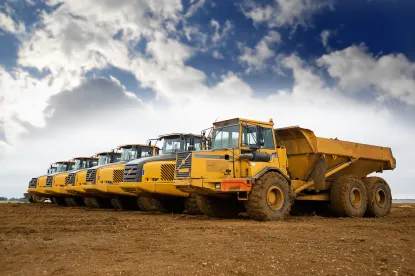On March 11, 2019, OSHA issued a Request for Information (RFI) in the Federal Register seeking comments and information from stakeholders regarding the use of powered industrial trucks (PITs) for maritime (1915.120, 1917.43, 1918.65) construction, (1926.602(c), (d)), and general industries (1910.178). OSHA is considering revising current standards regarding powered industrial trucks and this information will assist the agency in determining what actions, if any, it will take in revising these standards.
The initial powered industrial truck standard, 1910.178, was adopted in 1971 for general industry and was based on the existing American National Standards Institute’s (ANSI) Safety Standard for Powered Industrial Trucks B56.1 and the National Fire Protection Association’s (NFPA) standard for Type Designation, Areas of Use, Maintenance and Operation of Powered Industrial Trucks, NFPA 505. OSHA has revised the the general industry standard only once in 1998. However, the ANSI and NFPA consensus standards have been updated and revised multiple times since the initial promulgation of OSHA’s rule. Both consensus standards have 2018 versions. The ANSI B56.1 standard includes requirements currently not found in the OSHA standards such as a requirement that operator training cover hazards, including symptoms of exposure, from carbon monoxide produced by internal combustion engines, a requirement to consider noise exposure of personnel in the work area, and a requirement for stopping distances when descending grades. Similarly, the 2018 NFPA 505 includes an additional 8 designated types of trucks not currently found in OSHA’s standards.
OSHA is requesting information from the public to determine what changes, if any, should be made to the powered industrial truck requirements in all industries. Specifically OSHA is seeking public comment “on what aspects of the powered industrial trucks standards are effective as well as those that may be outdated, inefficient, unnecessary, or overly burdensome, and how those provisions might be repealed, replaced, or modified while maintaining or improving worker safety.”
The RFI seeks information in various categories and outlines specific questions for each category of information requested such as:
- Types of Powered Industrial Trucks
- The types of trucks used in an employers fleet, such as types, the number of employees assigned to operate these trucks, what types of activities the trucks are being used for
- Other types of trucks OSHA should consider including in a future standard
- Truck Operations, Maintenance, and Training
- Is in training performed in-house or is it contracted out
- If in-house training is performed do you purchase modules or develop your own
- Who provides the training
- Are OSHA’s current training requirements adequate or excessive
- Does your workplace have a training program that you think is more effective than what OSHA currently requires
- Incidents and Injuries
- What are the most common types of incidents and injuries involving PITs
- Do incidents vary by type of truck and if so how
- Consensus Standards
- Does compliance with ANSI/ITSDF B56.1a-2018 address most hazards encountered with PITS
- Is it preferable to the current OSHA standards
- Are there any hazards that ANSI does not address
- Are employers currently in compliance with NFPA 505-2018
- Compliance Issues
- Should OSHA grandfather older equipment manufactured before a certain date
- How many older PITSs are you using
- How many PITS do you use that do not have seat belts
- What is the average life span of a powered industrial truck
OSHA is accepting comments until June 10, 2019 and comments can be submitted electronically at Regulations.gov using Docket No. OSHA-2018-0008. Comments can also be submitted via facsimile or regular mail and additional information on submission of comments can be found in the Federal Register.




 />i
/>i

